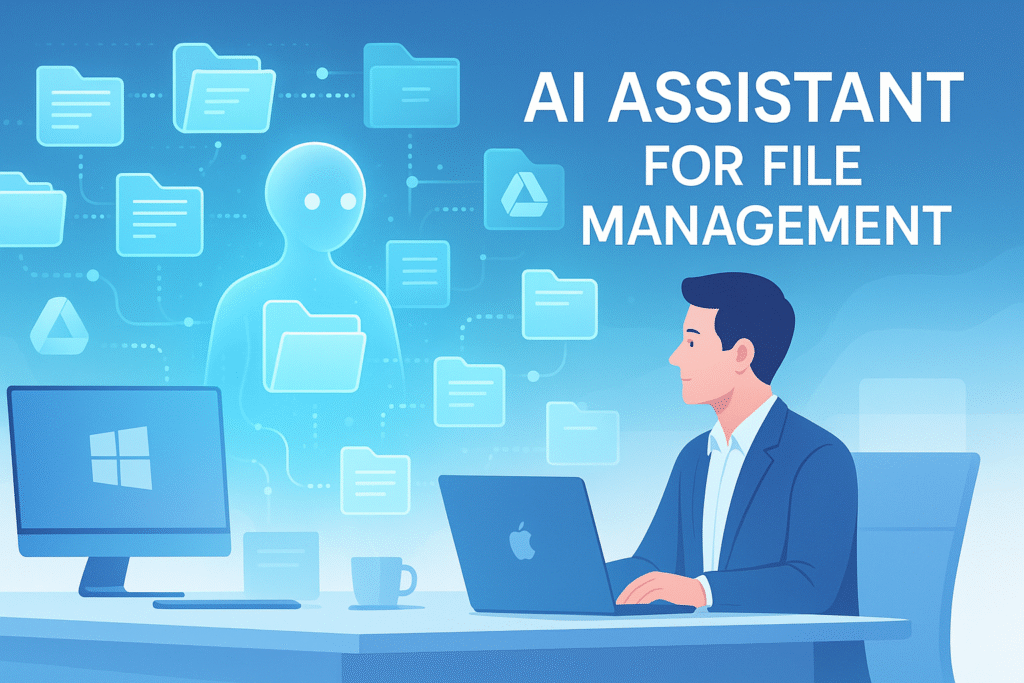“Simplify your digital life! Discover how an AI assistant for file management revolutionizes organization across Google Drive, Windows, and Mac, ending cluttered folders and lost documents.”
We’ve all been there. A frantic search through a maze of folders, dozens of unhelpfully named files, and that nagging feeling that you know the document exists somewhere. Your digital life, once a neat collection of files, has spiraled into a chaotic mess. This isn’t just an inconvenience; it wastes time, stifles productivity, and causes unnecessary stress. The good news? A powerful solution exists: an AI assistant for file management.
In today’s digital world, we create, receive, and store more files than ever. The sheer volume can be overwhelming, from work documents and personal photos to essential receipts and project outlines. This explosion of data often leads to a standard set of problems. You end up with cluttered folders, duplicate files, and a system that makes finding anything a frustrating treasure hunt. Time wasted searching for documents quickly adds up, impacting your efficiency and professional output. This is where AI-powered tools offer a revolutionary approach to digital organization. They promise to automatically organize, tag, sort, and retrieve your documents efficiently.

The Pain of Digital Disarray: More Than Just a Mess
Think about the last time you urgently needed a specific file. It may be a client proposal, a tax document, or a cherished family photo. Did you find it instantly, or did you spend precious minutes, even hours, digging through ambiguously named folders like “Misc,” “Documents 2024,” or “Stuff to Sort”? This frustrating experience is a direct consequence of poor file organization.
The common challenges are universal. First, we face cluttered folders. Our desktops become graveyards of downloads, screenshots, and unsorted files. Our “Documents” folder often mirrors a digital junk drawer. This visual chaos alone can increase stress and make it difficult to focus. Second, lost documents become a regular occurrence. You know you saved it, but where? Was it on your local drive, in Google Drive, or a different cloud service? The more places you store files, the higher the chance of misplacing them. Finally, the time wasted searching for files is arguably the biggest productivity killer. Every minute spent hunting for a document is not spent on productive work, creative tasks, or personal pursuits. This inefficiency adds up, impacting deadlines and overall workflow.
These issues aren’t just minor annoyances. For professionals, it can mean missed deadlines, reduced client satisfaction, and a constant feeling of being behind. For personal users, it might mean failing to find that critical warranty, struggling to compile old photos, or simply feeling overwhelmed by your digital footprint. Moreover, unorganized files can pose security risks. If you can’t find your files, how do you know sensitive information is adequately secured or removed when no longer needed? Compliance also becomes a challenge, as businesses need to ensure proper data retention and easy retrieval for audits.
The traditional approach to file management relies on manual effort. We create folders, rename files, and try to maintain a consistent system. However, this method is prone to human error and cannot keep pace with the volume of files we generate today. We get busy, we prioritize other tasks, and our meticulous systems quickly fall apart. This is why the promise of an AI assistant for file management is so compelling. It offers a way to automate this tedious and often neglected task, bringing order to the digital chaos without constant manual intervention.
AI to the Rescue: The Intelligent Organizer
Imagine a system that understands your files, not just their names or creation dates. This is the core power of an AI file management assistant. These tools leverage advanced technologies like machine learning, natural language processing (NLP), and optical character recognition (OCR) to manage your digital assets intelligently.
Here’s how an AI file organizer typically works:
- Automatic Organization: Instead of you dragging and dropping files into folders, the AI does it for you. It learns from your habits and the content of your files. For example, a scanned invoice might automatically go into a “Financial Records” folder, while meeting notes land in “Project X – Meetings.”
- Intelligent Tagging: Beyond just putting files in folders, AI can apply relevant tags and metadata. These tags describe the document’s content, participants, dates, or keywords. This is a game-changer for search, as you can find files based on concepts rather than just exact file names. Consider searching for “marketing strategy presentation Q3” and getting results even if the file is named “Project Alpha Deck.pptx.”
- Intelligent Sorting: AI can sort files based on various criteria, from document type and creation date to project affiliation and importance. It can even prioritize files based on your recent activity or upcoming deadlines.
- Effortless Retrieval: With intelligent tagging and organization, finding files becomes remarkably simple. You can use natural language queries like talking to a human assistant. The AI understands context and intent, providing highly relevant results even if your query doesn’t match. This vastly reduces search time and frustration.
- Duplicate Detection and Cleanup: AI can identify and flag duplicate files, helping you declutter your storage and free up valuable space. Some tools suggest which version to keep based on modification dates or content.
- Content Summarization and Extraction: Some advanced AI assistants can summarize lengthy documents, extracting key points, action items, or specific data fields. This is incredibly useful for quickly grasping the essence of a document without reading it entirely.
The underlying technology allows these systems to “understand” your files. NLP helps them read and comprehend text within documents, while machine learning algorithms identify patterns and learn from their interactions. OCR, for its part, turns scanned images and PDFs into searchable text, bringing even your old paper documents into the digital, organized fold. This deep understanding means the AI assistant can anticipate your needs and manage files intuitively and personally, adapting to your unique workflow over time.
Cross-Platform Power: Anywhere, Anytime
One of the most significant advantages of an AI assistant for file management is its ability to operate across different platforms. We rarely limit ourselves to a single operating system or cloud service. Most people use a mix: a Windows PC at work, a MacBook at home, and Google Drive for collaborative projects. An effective AI file organizer needs to bridge these gaps.
- Google Drive AI Assistant: Google Drive is a ubiquitous cloud storage solution, and its integration with AI is steadily growing. Google’s AI features, like Smart Search, use machine learning to improve file retrieval. Beyond native capabilities, third-party AI assistants can connect directly to your Google Drive. These tools can analyze your Drive’s content, automatically categorize documents, suggest folders, and even identify redundant files. This means your extensive collection of shared documents, spreadsheets, and presentations can finally achieve a state of consistent organization, making collaboration smoother and finding important shared files effortless.
- AI File Organizer for Windows: AI assistants offer a direct solution to local file chaos for Windows users. They can scan your hard drive, identify file types, and suggest intelligent folder structures. Some AI-powered tools integrate directly into Windows Explorer, seamlessly organizing your downloads, documents, and multimedia files. They can automatically rename files based on their content, apply tags, and even clean up your desktop, ensuring your local machine remains tidy and efficient. Tools like Nexa AI File Organizer and BuddyX AI Naming Suite are examples of solutions focusing on local processing for Windows privacy and efficiency.
- AI File Organizer Mac: macOS users benefit significantly from AI file management. Macs are known for their sleek interfaces, but even a Mac can succumb to digital clutter. AI file managers for Mac can help. They often feature intuitive drag-and-drop interfaces combined with intelligent automation. Sparkle AI File Organizer, for instance, is designed specifically for Mac, promising to create personalized folder systems and automatically organize new and existing files based on their names. Files Magic AI also offers AI-based file organization for macOS, automatically keeping selected folders organized and removing clutter. These tools help maintain the clean and efficient workflow that Mac users appreciate.
The cross-platform relevance ensures that no matter where your files reside—on your local machine (Windows or Mac), in the cloud (Google Drive, OneDrive, Dropbox), or across various document management systems—your AI assistant can help bring order to the chaos. This unified approach simplifies your entire digital ecosystem, reducing the need to manage different systems manually and ensuring a consistent organizational logic across all your devices and accounts.
Real-World Tools: AI in Action
The concept of an AI assistant for file management isn’t futuristic; it’s a present-day reality with several innovative tools making a real impact.
- Sparkle AI File Organizer: As mentioned, Sparkle AI is specifically tailored for Mac users. It focuses on simplifying file organization by creating a personalized folder system. Sparkle automatically sorts new and existing files into designated folders, including “Recents,” “Manual Library,” and “AI Library.” A key privacy feature is that Sparkle organizes files based on their names, not by accessing or reading their content. This makes it an excellent choice for users who prioritize automated organization while maintaining control over their data’s privacy. It’s perfect for tackling messy Downloads and Desktop folders.
- Bit.ai: Bit.ai is more than just a file organizer; it’s a robust document management system with AI capabilities. It allows users to create, organize, and collaborate on smart AI-powered documents and wikis. Bit.ai excels in process documentation, helping businesses streamline workflows and ensure consistency. Its AI features assist with quick document creation, content customization, and efficient organization, making it ideal for teams that manage a large volume of collaborative documents and knowledge bases. Bit.ai leverages AI prompts to help users quickly generate and organize content.
- Local File Organizers: Beyond dedicated AI apps, some local file organizers incorporate AI features. These tools often run directly on your computer, offering privacy and speed. For instance, tools like Nexa AI File Organizer for Windows and Linux and LocalLLaMA File Organizer (an open-source project) focus on local processing power to understand file types, generate relevant names, and offer customizable naming patterns. They are great for users dealing with sensitive data or prefer to keep their file management on their machines.
- Document Management Systems with AI: Comprehensive document management systems (DMS) are increasingly integrating AI for businesses. These systems go beyond simple file organization, offering features like intelligent data extraction, automated compliance checks, and workflow automation. They can process large volumes of unstructured data, classify documents, and extract specific information from invoices, contracts, and other business records. Tools like Google Cloud’s Document AI leverage generative AI to extract, classify, and split documents with high accuracy, even from scanned files. These enterprise-level solutions are transformative for managing complex organizational data.
- AI Google Drive Organizer: While Google Drive has its own AI features, there are also third-party integrations and strategies to enhance its organization. These involve scripts that use AI to sort files based on content, or extensions that provide more advanced tagging and search capabilities. The goal is to move beyond manual folder creation in Google Drive, making your shared and personal cloud files instantly accessible and intelligently categorized.
These examples illustrate the diverse applications of AI in file management, ranging from personal desktop tidying to enterprise-level document processing. The common thread is the reduction of manual effort and the significant boost in efficiency and accuracy that AI brings.
Benefits for Everyone: Personal and Professional Gains
The advantages of adopting an AI assistant for file management are far-reaching, impacting both individual users and large organizations.
For Personal Users:
- Reclaim Your Time: This is the most immediate and impactful benefit—no more endless searching. Your files are where they should be, easily discoverable through intelligent search. This frees up countless hours you can dedicate to hobbies, family, or relaxing.
- Reduce Stress and Overwhelm: A cluttered digital space often mirrors an untidy mind. An organized system brings a sense of calm and control. The anxiety of not being able to find something important disappears when you know an AI is working behind the scenes to keep things in order.
- Boost Productivity: Whether working on a side project, managing household finances, or organizing photos, efficient file access means you can get things done faster. You spend less time on administrative tasks and more time on the actual work or activity.
- Maintain Digital Hygiene: An AI assistant encourages good habits without requiring constant vigilance. It automatically cleans up your downloads folder, identifies duplicates, and ensures a consistent naming convention, leading to a healthier digital environment.
- Future-Proof Your Files: As your digital collection grows, manually managing it becomes unsustainable. An AI system scales with your needs, ensuring that even years later, your files remain organized and accessible.
For Professional Users and Businesses:
- Increased Operational Efficiency: Quick access to information is critical for teams. An AI file manager means employees spend less time searching for documents and more time on core business activities. This directly translates to higher productivity and faster project completion.
- Improved Collaboration: Team collaboration becomes smoother when files are consistently organized and easily discoverable. Everyone can find the latest version of a document, access relevant project materials, and share information without friction. Version control, often a nightmare in manual systems, is also greatly enhanced by AI-powered DMS.
- Enhanced Data Security and Compliance: AI can help classify sensitive documents, apply appropriate access controls, and monitor for unauthorized access. FI can automate compliance checks for regulated industries, ensuring documents meet legal and industry standards for retention and privacy. This reduces the risk of data breaches and non-compliance fines.
- Better Decision-Making: With AI-powered insights and rapid data retrieval, decision-makers have immediate access to the necessary information. AI can even summarize key data from various reports, providing a consolidated view for strategic planning. This leads to more informed and agile business decisions.
- Reduced Manual Errors: Human error is inevitable in manual file management. AI automates repetitive tasks like naming, tagging, and sorting, significantly reducing the chances of misfiling or losing important documents.
- Scalability: As businesses grow, so does their volume of digital assets. AI-powered document management systems are built to scale, handling vast amounts of data without a proportional increase in manual effort.
Both personal and professional users can see the tangible benefits. An AI assistant for file management isn’t just a convenience; it’s a strategic tool for optimizing your digital life and work.
Getting Started with AI File Management
The journey to an organized digital life with AI begins with a few key steps. First, assess your current situation. Where do you store most of your files? What are your most significant pain points? Are you primarily a Windows user, a Mac enthusiast, or heavily reliant on cloud services like Google Drive? Understanding your needs helps you choose the right AI assistant for file management.
Next, research available tools. Look for solutions that cater to your specific platform and address your organizational challenges. Consider factors like ease of use, features offered (automatic tagging, content analysis, duplicate detection, etc.), privacy policies, and pricing. Many tools offer free trials, allowing you to test them before committing.
When using an AI assistant, be prepared for an initial learning phase. The AI learns from your interactions and preferences. It gets smarter over time. You should provide some initial guidance, correct its classifications occasionally, or set up specific rules for certain file types. The more you use it, the better it becomes at anticipating your needs and organizing your files exactly how you prefer.
Furthermore, integrate your chosen AI assistant with your existing workflows. If you use Google Drive extensively, ensure seamless integration. If you work primarily on your local machine, pick a tool that deeply integrates with your operating system’s file explorer. The goal is to make the AI assistant a natural extension of your digital habits, not an additional layer of complexity.
Finally, remember that AI is a tool to empower you, not to replace your responsibility entirely. While it automates a lot, periodic reviews of your file structure and the AI’s performance can ensure everything remains optimized and aligned with your evolving needs. Think of it as a competent, tireless assistant who cares for the mundane, allowing you to focus on what truly matters.
Introducing ScaleWise AI: Your Marketplace for AI Agents
Imagine a world where finding the perfect AI assistant for any task is as easy as browsing an online store. That’s the promise of ScaleWise AI, our revolutionary marketplace connecting those who need AI solutions with those who create them. Whether you’re seeking an AI agent to streamline your workflow or have the talent to build and sell AI tools, our platform offers a dynamic space to connect, collaborate, and thrive.
For Those Seeking AI Power:
- A Vast Library of AI Agents: We boast a diverse and growing collection of AI agents designed for specific tasks and industries. Forget endlessly searching for the right tool; ScaleWise AI directly brings the solutions.
- Find Your Perfect AI Match: Need an AI agent to manage your social media, automate your customer service, or organize your files? Our intelligent search and categorization make it easy to discover the perfect AI assistant for your unique needs.
- Ready-Made Solutions: Skip the complex development process. We provide access to ready-to-use AI agents, allowing you to quickly implement robust AI solutions and see immediate results.
For AI Creators and Innovators:
- Showcase Your AI Expertise: ScaleWise AI offers a platform to showcase your AI agent creations to a global audience. Reach potential customers who are actively seeking AI solutions for their specific needs.
- Turn Your AI into a Revenue Stream: Monetize your AI skills by selling your AI agents on our marketplace. Set your pricing, manage your listings, and build a successful business around your AI expertise.
- Connect and Collaborate: ScaleWise AI fosters a vibrant community of AI developers and users. Connect with other creators, share knowledge, and collaborate on innovative AI solutions right here with us.
ScaleWise AI is more than just a marketplace; it’s our hub for the future of AI. We empower individuals and businesses to harness the power of AI while providing creators with the tools and platform to thrive. Whether you’re looking for an AI agent to solve a specific problem or want to share your AI creations with the world, ScaleWise AI is your gateway to the exciting world of AI-driven solutions.
The Future is Organized
The digital landscape continues to expand, and with it, the challenge of managing our ever-growing collection of files. Manually sorting, tagging, and retrieving documents is simply no longer sustainable. AI assistants for file management are not a luxury; they are becoming necessary for anyone looking to maintain control over their digital life.
These intelligent tools simplify digital file management across all platforms, from Google Drive to your local Windows or macOS machine. They tackle the everyday frustrations of cluttered folders, lost documents, and wasted search time. AI liberates you from digital chaos by automatically organizing, tagging, sorting, and retrieving your files. Tools like Sparkle AI and Bit.ai demonstrate the real-world applications of this technology, showcasing the immediate benefits for both personal and professional users.
Embrace the power of AI to transform your digital file management. It’s time to stop drowning in digital clutter and enjoy a streamlined, efficient, and stress-free digital experience. Your future self will thank you for switching to an AI-powered organizational system.
Frequently Asked Questions (FAQs)
Q1: What exactly is an AI assistant for file management?
An AI file management assistant uses artificial intelligence, including machine learning and natural language processing, to automatically organize, classify, tag, and help retrieve digital files. It learns from your data and habits to create an efficient and searchable file system.
Q2: Can an AI file organizer work with my existing Google Drive files?
Yes, absolutely. Many AI file organizers offer direct integration with cloud services like Google Drive. They can scan your existing Drive, apply intelligent tags, organize files into logical folders, and help you find documents more efficiently through AI-powered search capabilities.
Q3: Is an AI file organizer suitable for Windows and Mac users?
Yes, AI file organizers are designed to be cross-platform. Specific AI file organizers are available for Windows (e.g., Nexa AI File Organizer) and macOS (e.g., Sparkle AI File Organizer, Files Magic AI), as well as cloud-based solutions that work universally across any operating system.
Q4: How does AI organize my files? Does it read my personal information?
AI organizes files by analyzing various aspects. It looks at file types, creation dates, and sometimes even the file’s content using natural language processing. Some tools, like Sparkle AI, specifically state they only use file names for organization to protect your privacy, while others may process content for deeper insights. It’s essential to check the privacy policy of any tool you consider.
Q5: Will using an AI assistant for file management save me time?
The time saved from manually sorting files, renaming documents, and searching for lost information adds up quickly. AI automates these tedious tasks, allowing you to focus on more important work or personal activities. Think of it as freeing up several hours you spend on digital housekeeping a week.
Q6: Are there any free AI file management tools available?
Some tools offer free tiers with limited features or trials that allow you to test them. Cloud services like Google Drive incorporate basic AI features for search and organization. Additionally, some open-source AI-powered file organizers are available for tech-savvy users. However, paid versions or subscriptions are usually necessary for a full suite of advanced features and robust support.
Q7: How secure are cloud-based AI file organizers, especially with sensitive documents?
Reputable cloud-based AI file organizers prioritize security. They typically employ strong encryption for data in transit and at rest, adhere to industry-standard security protocols, and offer features like access controls and audit trails. Many also comply with data privacy regulations. However, it’s always wise to research any specific service’s security measures and privacy policies, especially if you handle highly sensitive information.
Q8: Can AI file organizers help with duplicate files?
Yes, many AI file organizers have features to detect and manage duplicate files. They can identify redundant copies, suggest which version to keep based on criteria like modification date or file size, and help you remove unnecessary duplicates, freeing up storage space.
Q9: What if the AI organizes my files incorrectly? Can I correct it?
Most AI file organizers allow for user intervention and correction. AI systems learn over time, and your feedback helps them improve their understanding of your preferences. You can typically move files to the correct location, rename them, or adjust tags, and the AI will learn from these manual adjustments to refine its future organization.
Q10: Is an AI assistant for file management only for large businesses, or can individuals benefit?
Both individuals and businesses can benefit immensely. While large companies gain significant operational efficiencies and compliance advantages, individuals can reclaim precious time, reduce digital stress, and maintain a much more organized personal digital life. The benefit scale simply adjusts to the volume and complexity of the managed files.





